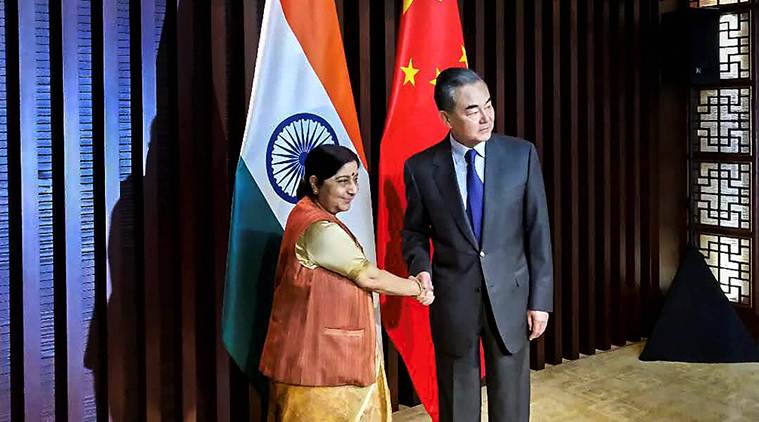The statement comes days after Vice Foreign Minister Kong Kong Xuanyou was dispatched to Pakistan where he held series of meetings with Prime Minister Imran Khan, Army Chief Gen Qamar Javed Bajwa, Foreign Minister Shah Mahmood Qureshi.
Written by Sowmiya Ashok | Beijing |March 8, 2019 The Indian Express

Pakistan and India are neighbours and always have to live with each other,” Wang said. (PTI/File)
Ahead of the United Nations Security Council (UNSC) deadline for countries to raise objections against a proposal to term Jaish-e-Mohammad (JeM) chief Masood Azhar as a ‘global terrorist’, China Friday termed Pakistan it’s “iron brother” and said it welcomed de-escalation of tensions between India and Pakistan. The statement comes days after Pakistan Army spokesperson Major General Asif Ghafoor said that JeM “does not exist” in Pakistan.
Chinese Foreign Minister Wang Yi said that he hoped India and Pakistan will quickly “turn the page” for “long term improvement” in their relations. “China hopes the two countries will get along and India, Pakistan will transform the crisis into an opportunity and will meet each other halfway,” he said. “When confrontation gives way to dialogue, and disagreements are settled….they can create a better future through cooperation,” the Foreign Minister added.
Addressing a press conference as part of the second session of the 13th National People’s Congress in Beijing, Wang in response to a separate question on China’s relationship with India noted that the two countries should “collectively” make “huge contributions to Asia’s revitalisation and prosperity.”
Wang’s comments follow Chinese Vice Minister of Foreign Affairs Kong Xuanyou’s visit to Pakistan this week where he met with Pakistan Prime Minister Imran Khan and other top officials. “….China has stressed from the beginning the need to exercise calm and restraint, prevent escalation, find out what has happened and resolve the matter through dialogue. In the meantime, the country’s sovereignty and territorial integrity should be fully respected. China has followed these principles in its meditation methods and played a constructive role in diffusing the tension,” Wang said on Friday.
To a question on the significance of last year’s Wuhan summit where Chinese President Xi Jinping and Prime Minister Narendra Modi met, and the way forward for bilateral relations of the two nations, Wang said that 2018 was a “year of significance” for both countries. “The historic meeting between President Xi and Prime Minister Modi in Wuhan created a new model of high-level interactions between our two countries,” he said, pointing out that it was not just significant as forging of friendship between the two leaders but also “set the direction” for future relations.
“As two ancient civilisations with a combined population of 2.7 billion, as two large developing countries, and neighbours, China and India should be each other’s partners in pursuing our respective dreams and each other’s important opportunity for growing our respective economies. Collectively we must make our huge contribution to Asia’s revitalisation and prosperity,” Wang said. He said that priority now was to see the “strategic understanding” of the two leaders “trickle down to our people.” “…people to people ties which is of vital importance in the current context so our friendship and cooperation will surge ahead like the Yangtze and the Ganges giving strong and sustained impetus to our relationship,” he said.
